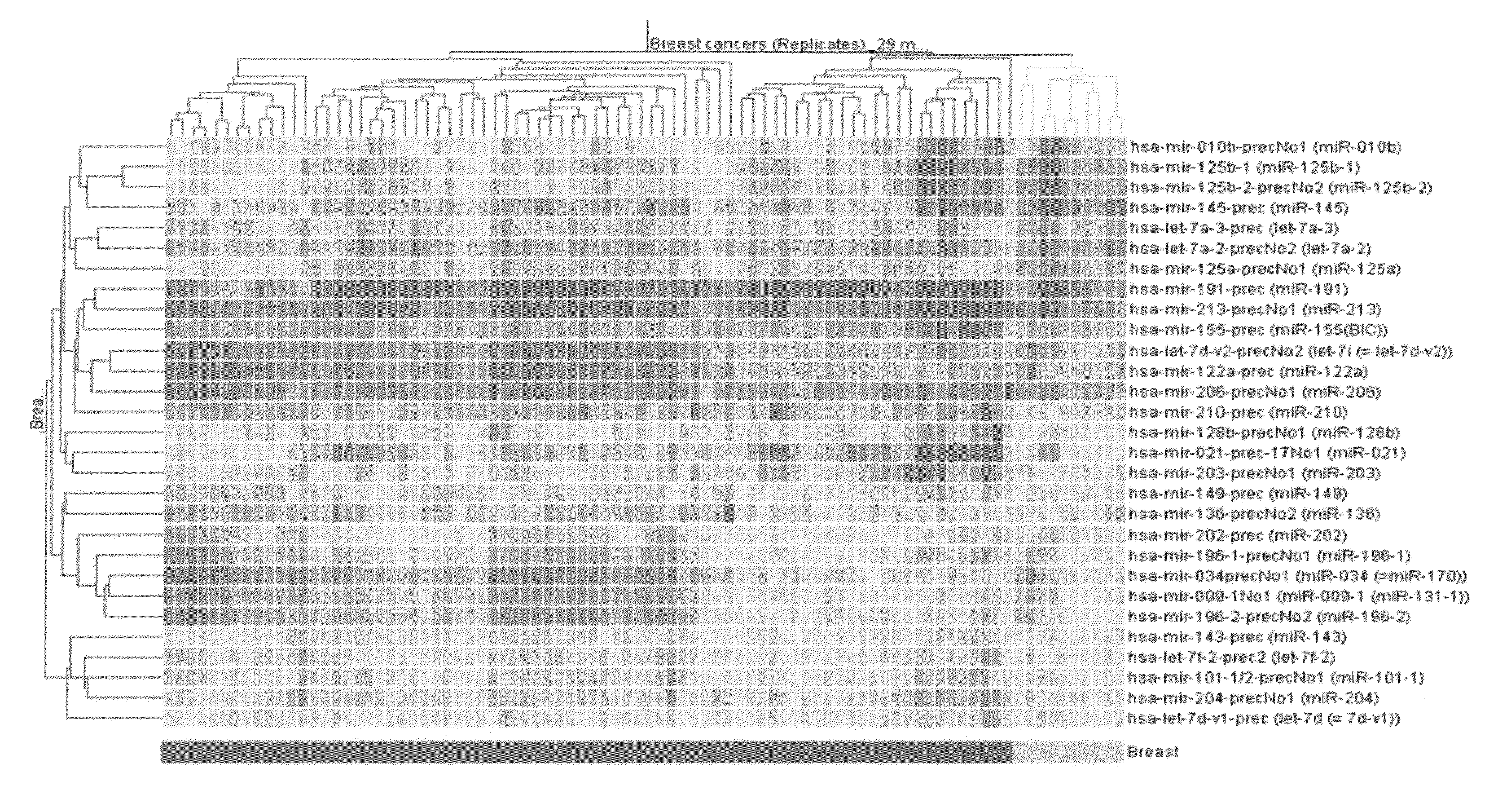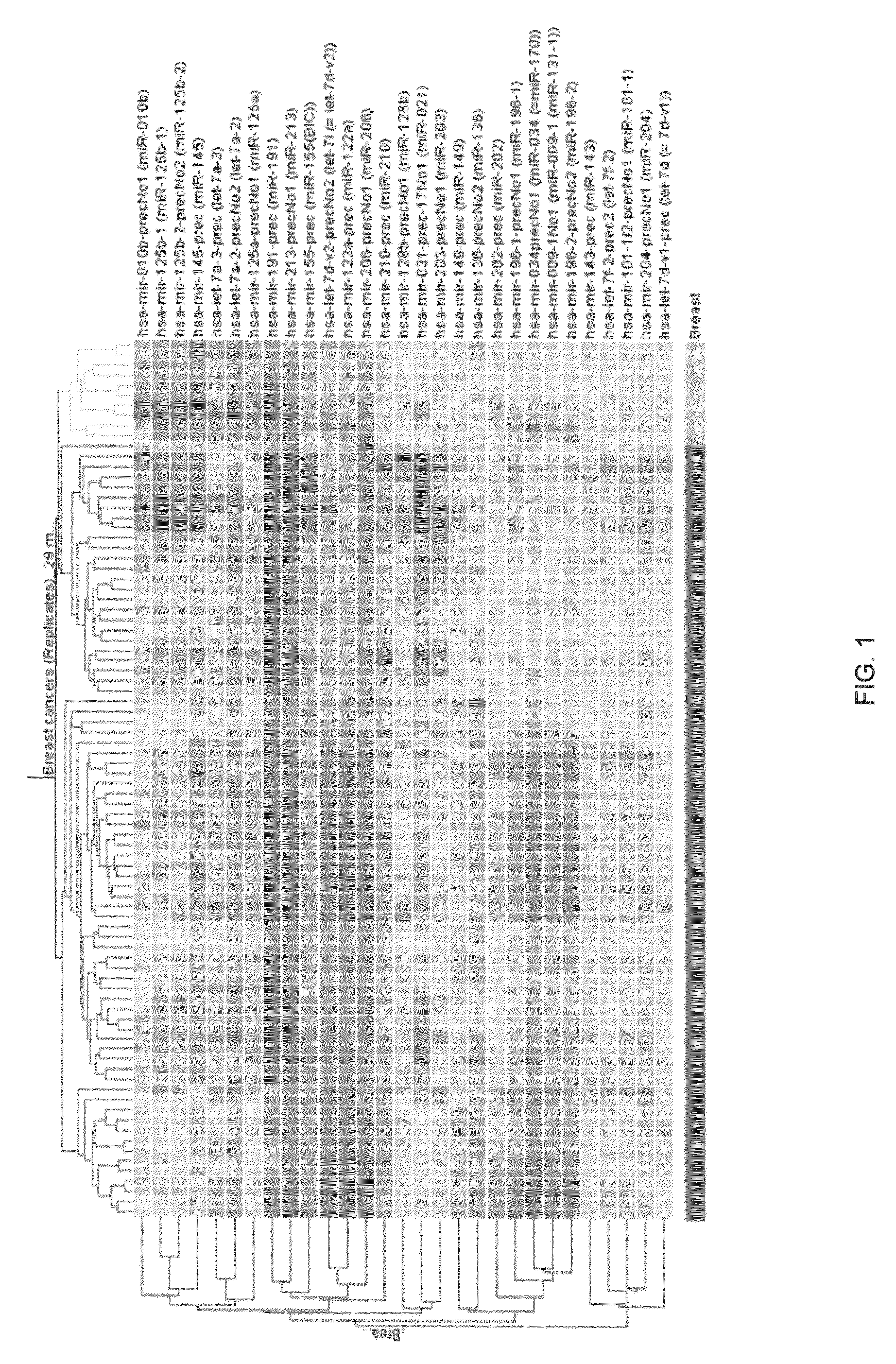MicroRNA-based methods and compositions for the diagnosis, prognosis and treatment of breast cancer
a technology of microrna and breast cancer, applied in the direction of drug compositions, ict adaptation, genetic material ingredients, etc., can solve the problems of breast cancer that is difficult to diagnose and treat effectively, no universally successful method for breast cancer treatment or prevention is currently available, and the level of mir gene product is increased, the expression level is reduced, and the effect of improving the level of mir gene produ
- Summary
- Abstract
- Description
- Claims
- Application Information
AI Technical Summary
Benefits of technology
Problems solved by technology
Method used
Image
Examples
example 1
Identification of a microRNA Expression Signature that Discriminates Breast Cancer Tissues from Normal Tissues
Materials and Methods
[0128]Breast cancer samples and cell lines. RNAs from primary tumors were obtained from 76 samples collected at the Universit of Ferrara (Italy), Istituto Nazionale dei Tumori, Milano (Italy) and Thomas Jefferson University (Philadelphia, Pa.). Clinico-pathological information was available for 58 tumor samples. RNA from normal samples consisted of 6 pools of RNA from 5 normal breast tissues each, as well as RNTA from 4 additional single breast tissues. Breast cancer RNAs were also obtained from the following cell lines: Hs578-T, MCF7, T47D, BT20, SK-BR-3, HBL100, HCC2218, MDA-MB-175, MDA-MB-231, MDA-MB-361, MDA-MB-435, MDA-MB-436, MDA-MB-453 and MDAMB-468.
[0129]miRNA microarray. Total RNA isolation was performed with Trizol Reagent (Invitrogen) according to the manufacturer's instructions. RNA labeling and hybridization on microRNA microarray chips was ...
example 2
Determination of Putative Gene Targets of miRNAs that are Deregulated in Breast Cancer Tissues
[0138]At present, the lack of knowledge about bona fide miRNA gene targets hampers a full understanding of which biological functions are deregulated in cancers characterized by aberrant miRNA expression. To identify putative targets of the most significantly de-regulated miRNAs from our study: miR-10b, miR125b, miR-145, miR-21 and miR-155 (see Example 1), we utilized multiple computational approaches. In particular, the analysis was performed using three algorithms, miRanda, TargetScan and PicTar, which are commonly used to predict human miRNA gene targets (Enright, A. J., et al. Genome Biol. 5:R1 (2003); Lewis, B. P. et al., Cell 115:787-798 (2003); Krek, A., et al., Nat. Genet. 37:495-500 (2005)). The results obtained using each of the three algorithms were cross-referenced with one another to validate putative targets and only targets that were identified by at least 2 of the 3 algorith...
example 3
Bio-pathological Features and microRNA Expression
Materials and Methods
Immunohistochemical Analysis of Breast Cancer Samples.
[0142]Staining procedures were performed as described (Querzoli, P., et al., Anal. Quant. Cytol. Histol. 21:151-160 (1999)). Hormonal receptors were evaluated with 6F11 antibody for estrogen receptor a (ER) and PGR-1A6 antibody for progesterone receptor (PR) (Ventana, Tucson, Ariz., U.S.A.). The proliferation index was assessed with MIB1 antibody (DAKO, Copenhagen). ERBB2 was detected with CB 11 antibody (Ventana, Tucson, Ariz., U.S.A.) and p53 protein expression was examined with D07 antibody (Ventana, Tucson, Ariz., U.S.A.). Only tumor cells with distinct nuclear immunostaining for ER, PR, Mib1 and p53 were recorded as positive. Tumor cells were considered positive for ERBB2 when they showed distinct membrane immunoreactivity.
[0143]To perform a quantitative analysis of the expression of these various biological markers, the Eureka Menarini computerized image ...
PUM
| Property | Measurement | Unit |
|---|---|---|
| Northern blot | aaaaa | aaaaa |
Abstract
Description
Claims
Application Information
 Login to View More
Login to View More - R&D Engineer
- R&D Manager
- IP Professional
- Industry Leading Data Capabilities
- Powerful AI technology
- Patent DNA Extraction
Browse by: Latest US Patents, China's latest patents, Technical Efficacy Thesaurus, Application Domain, Technology Topic, Popular Technical Reports.
© 2024 PatSnap. All rights reserved.Legal|Privacy policy|Modern Slavery Act Transparency Statement|Sitemap|About US| Contact US: help@patsnap.com










